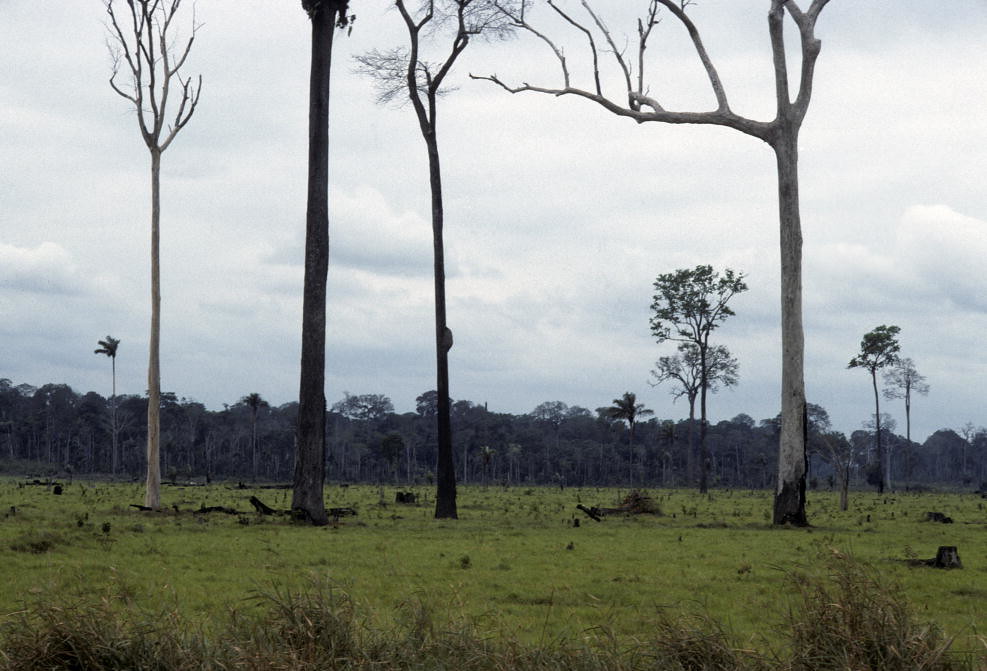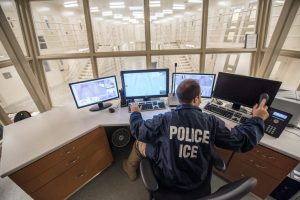
Will New York’s ‘TREES’ Bill Finally Become Law?
A bill that aims to stop companies that have contracts with the state government from contributing to tropical deforestation failed to become law last year. Will the governor veto it again?
United Nations Photo/P Sudhakaran
Deforestation in the rain forest in Acre, Western Brazil. Forest loss and damage is the cause of around 10 percent of global warming.
Over 150 international environmental organizations delivered a letter to Gov. Kathy Hochul on Friday demanding that she sign New York’s “TREES” Act into law.
The bill, which stands for the Tropical Rainforest Economic & Environmental Sustainability (TREES) Act, gives New York power to ensure that companies doing business with the state government aren’t contributing to tropical deforestation. It passed both legislative houses this spring and now waits for Hochul’s signature, for the second year in a row.
The idea is to screen the supply chain of companies to make sure they don’t extract commodities from degraded tropical forests to make products like coffee, cocoa, and palm oil, which is used in a variety of processed food. Companies like Sysco, Nestle and PepsiCo sell food to the state through contracts they have with government agencies, like the Department of Corrections and Community Supervision, which runs the state’s prison system.
But last year the bill failed to become law after it was vetoed by the governor. In a memo, Hochul said that asking corporations to vet their supply chains to ensure they are deforestation-free would “impose significant burdens” on companies and drive them away “from doing business with the State.”
To address the governor’s concerns, advocates revamped this year’s version of the bill. “We listened very carefully to what her objections were,” the TREES Act’s sponsor, State Sen. Liz Krueger, told City Limits.
While Krueger affirms she is “optimistic” the amendments will garner Hochul’s stamp of approval, environmental groups say they’ll keep pressuring the governor until she signs. Another letter championed by over 100 New York based organizations is in the works for next week.
The increased pressure comes at a time when Hochul and state lawmakers have scrapped or failed to pass several policies aimed at fighting climate change.
Earlier this month, the governor decided to indefinitely pause New York City’s congestion pricing program, which sought to reduce the amount of cars spewing pollution and greenhouse gasses into the atmosphere.
And the legislative session ended this spring without the passage of big ticket climate policies, despite Hochul becoming co-chair for the U.S. Climate Alliance and delivering remarks on climate leadership to the Vatican in May.
“The environmental and climate community are still waiting to see this governor’s level of commitment to making good on her promise about leading the way in building a safe future, not only for us, but for our children and future generations,” said Vanessa Fajans-Turner, executive director of Environmental Advocates New York (EANY).
In an emailed statement, Hochul’s press office said the governor would review the TREES Act and referred to comments she made earlier this month when she put the city’s congestion pricing program on hold.
“My commitment to a greener, more sustainable future is unwavering. I have been more committed to combating climate change and protecting our environment than any governor in our history,” Hochul said.
Gov. Hochul’s Office
Gov. Kathy Hochul at a climate-related press conference in 2022. She vetoed a different version of the deforestation bill last year.
Why does it matter, and what’s new?
While commodities like coffee, cocoa, and palm oil often come from degraded tropical forests in South America or Southeast Asia and not from New York, deforestation is a massive global issue that affects everyone.
Forest loss and damage is the cause of around 10 percent of global warming. Around the world, an estimated 18,000,000 acres of forest, an area more than half the size of New York State, are lost every year to deforestation, according to the nonprofit Friends of the Earth.
One of the most effective ways to tackle this degradation, environmentalists agree, is to pressure companies that use these resources to stop sourcing them from deforested areas.
The European Union, for instance, passed a regulation in 2022 requiring all companies—not just ones those with government contracts—to verify that goods sold on the market are deforestation-free.
“We are increasingly seeing governments around the world recognizing that it cannot be on the private sector’s shoulders alone to ensure that supply chains are legal and sustainable,” said Stephanie Cappa, director of policy and government affairs at World Wildlife Fund (WWF).
“There really is a critical role for governments like New York to play in this. And New York can take a real meaningful first step here for the United States,” she added.
To ensure that New York does take that step, lawmakers and advocates added some big exemptions to the TREEs Act that they believe will convince the governor to sign it.
For one, the time frame for the bill to go into effect has been pushed back by two years: companies won’t have to start proving their products are deforestation-free until 2027, up from 2025 in the previous version of the bill.
The bill also aims to strengthen a longstanding ban on the use of tropical hardwoods by state agencies and municipalities, including New York City, by covering all hardwoods, not just the list of prohibited tree species previously outlined in the regulation. But it includes carve outs for the both the MTA and the Staten Island Ferry (run by the city’s Department of Transportation), giving them five more years to comply.
The MTA uses tropical hardwoods for the ties or beams that support railroad and subway tracks because they possess water-resistant properties and are highly resistant to rot and insects. But the agency can switch to alternative materials like concrete.
“The MTA is transitioning away from tropical hardwood as quickly as possible,” a spokesperson for the transit authority said in an emailed statement.
And the MTA isn’t the only one getting a pass.
State agencies can get an exemption for following the rules if they can prove that they have failed “to receive any offers” from suppliers for products, or that there is “no alternative product” in the market to meet the demand.
To be exempt, state agencies have to submit a public explanation that includes “a list of all available alternative products considered and an explanation as to why each product does not meet the relevant generally accepted performance requirements.” The request will then have to get approved by the state’s budget director. If an agency doesn’t use the exemption for three consecutive years, it loses the ability to do so going forward.
These exceptions, advocates argue, don’t weaken the bill. Instead, they were added to ease the governor’s concerns that agencies with people under their care, like the Department of Corrections and Community Supervision, can still provide adequate food if they are unable to find a deforestation-free supplier.
“I don’t really see [the amendments] watering down the overarching importance of this legislation and what it’s going to actually mean,” said Senator Krueger. “I think we make things clearer.”
NYS Senate Media Services
State Sen. Liz Krueger, who sponsored the Deforestation bill in the Senate, speaking in 2022.
Sending a signal
Last year, a major reason the bill ended in a veto had to do with the fact that Krueger and advocates refused to let a watered down version get signed into law. After the bill passed both houses, the governor proposed changes that environmentalists refused to accept.
In Hochul’s version, advocates said, companies could simply present a certificate issued by a third party claiming their supply chain is deforestation-free. This could potentially excuse them from facing the more rigorous vetting process carried out by the state.
Advocates did not budge on allowing for third party certification schemes to replace the state’s vetting process in this year’s additions. But they did clarify that it’s up to the state’s Office of General Services to decide what each company must do to be considered deforestation-free.
While OGS could technically accept a third-party certificate as part of a vendor’s proof that their supply chain is clean, the legislation says a company would also have to complete a series of “due diligence measures” outlined by the government to identify the origin of their products “and ensure compliance with the policy.”
“There’s nothing in the bill that says reliance on third party certification schemes is good enough,” said Jeff Conant, director of the international forests program at the non-profit Friends of the Earth. OGS is in charge of determining exactly what those extra due diligence measures will be.
“Essentially what the amendments do is give OGS more leeway in terms of the implementation of the bill,” Conant added.
In the end, advocates say the new bill will accomplish what it set out to do: it gives the state power to vet a prospective contractor’s supply chain and decide if it wants to do business with them or not.
“We have taken great pains to address the governor’s concerns and we are taking them quite seriously,” said Farjans-Turner. “But this bill still sends a very important signal to global food markets.”
It would signal that New York will no longer tolerate the consumption of goods that help drive deforestation and climate change, Farjans-Turner explains. And this year the Empire State has shown that it is increasingly leaning in that direction.
In February, the New York Attorney General Letitia James filed a lawsuit against the world’s largest meat company, the Brazil-based, multinational JBS, for making a series of misleading claims about its plans to reduce greenhouse gas emissions.
The meatpacking giant, which operates in the U.S and is pursuing a listing on the New York Stock Exchange, has “profited from its fraudulent and illegal business activities across New York State,” the lawsuit says. The production of beef is generally known to be the food sector’s largest greenhouse gas emitter. But JBS, the lawsuit argues, promised to achieve net zero emissions by 2040 without a “viable plan to meet its commitment.”
“Signing the TREES Act would send a very important signal to companies like JBS that the markets are changing. It’s an important signal to the EU and others that New York expects the highest quality and most ethically and sustainably sourced products,” Farjans-Turner added.
To reach the reporter behind this story, contact Mariana@citylimits.org. To reach the editor, contact Jeanmarie@citylimits.org
Want to republish this story? Find City Limits’ reprint policy here.
The post Will New York’s ‘TREES’ Bill Finally Become Law? appeared first on City Limits.


